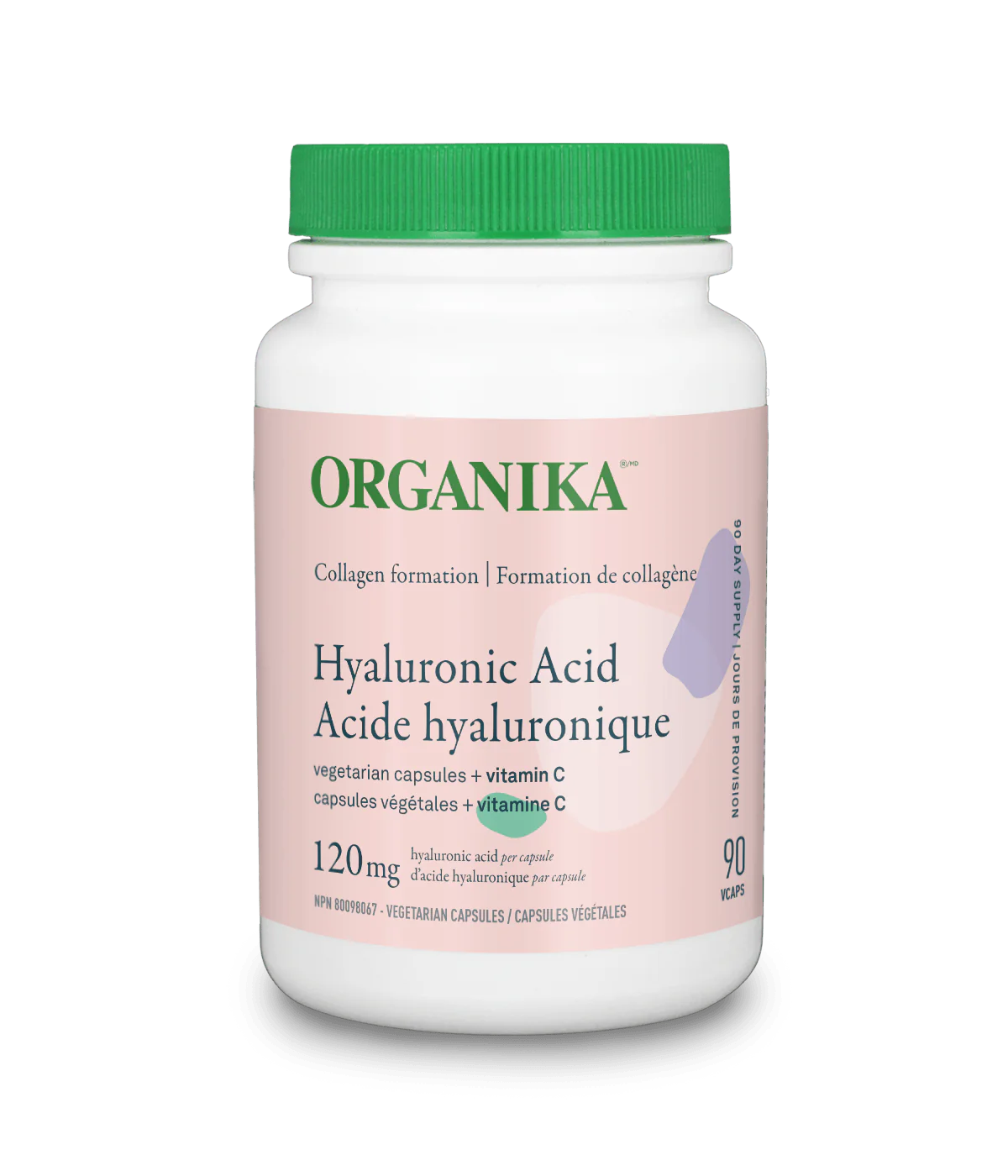

Organika | Hyaluronic Acid
Size :
Description
Hyaluronic acid and vitamin C team up for a major rejuvenating boost, supporting the natural production of skin-firming collagen and increasing hydration in connective tissues throughout the body. Once absorbed, Hyaluronic acid is broken down into smaller fragments before migrating to the skin, tissues, joints or wherever it is needed.
- Helps in collagen formation
- Supports bone and joint health
- Lubrication of joints
- Full-body tissue hydration
- Animal-origin free for a safer, purer, and more sustainable product
Hyaluronic acid is a molecule that our bodies naturally make, and it is most prevalent in our skin, the synovial fluid that lubricates our joints, and all tissues and fluids in the body. As we age, we see a decrease of hyaluronic acid in the body and our ability to produce new hyaluronic acid becomes impaired. Its functions include hydration, lubrication of joints, and regulation of several aspects of tissue repair. Hyaluronic acid is nothing new in the beauty industry, where it is hailed a hero skincare ingredient due to its remarkable water binding capabilities. Recently, oral consumption of hyaluronic acid products has gained interest due to its ability to hold approximately 1,000 times its weight in water.
In humans, hyaluronic acid in the skin accounts for 50% of the total body hyaluronic acid, and thus having adequate amounts in the skin is crucial for maintaining skin moisture. A growing number of studies have shown that by supplementing with hyaluronic acid, huge improvements in skin moisture, skin texture, and wrinkles can be observed. This is because the metabolites of hyaluronic acid can promote cell proliferation in the skin, and the resulting increase in cell number helps fill in the gaps in the skin and suppresses the skin’s water loss. Vitamin C supplementation is also linked to skin improvement due to its role in supporting collagen formation.
Ingredients
$45.99
SALEIn Stock Not In Stock
Quantity :
Description
Hyaluronic acid and vitamin C team up for a major rejuvenating boost, supporting the natural production of skin-firming collagen and increasing hydration in connective tissues throughout the body. Once absorbed, Hyaluronic acid is broken down into smaller fragments before migrating to the skin, tissues, joints or wherever it is needed.
- Helps in collagen formation
- Supports bone and joint health
- Lubrication of joints
- Full-body tissue hydration
- Animal-origin free for a safer, purer, and more sustainable product
Hyaluronic acid is a molecule that our bodies naturally make, and it is most prevalent in our skin, the synovial fluid that lubricates our joints, and all tissues and fluids in the body. As we age, we see a decrease of hyaluronic acid in the body and our ability to produce new hyaluronic acid becomes impaired. Its functions include hydration, lubrication of joints, and regulation of several aspects of tissue repair. Hyaluronic acid is nothing new in the beauty industry, where it is hailed a hero skincare ingredient due to its remarkable water binding capabilities. Recently, oral consumption of hyaluronic acid products has gained interest due to its ability to hold approximately 1,000 times its weight in water.
In humans, hyaluronic acid in the skin accounts for 50% of the total body hyaluronic acid, and thus having adequate amounts in the skin is crucial for maintaining skin moisture. A growing number of studies have shown that by supplementing with hyaluronic acid, huge improvements in skin moisture, skin texture, and wrinkles can be observed. This is because the metabolites of hyaluronic acid can promote cell proliferation in the skin, and the resulting increase in cell number helps fill in the gaps in the skin and suppresses the skin’s water loss. Vitamin C supplementation is also linked to skin improvement due to its role in supporting collagen formation.